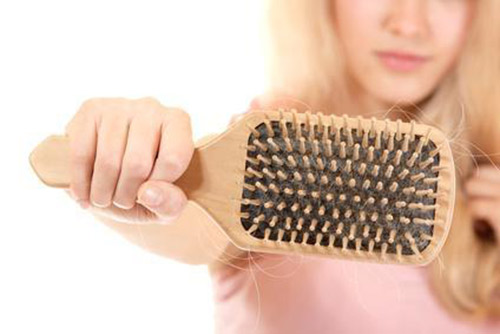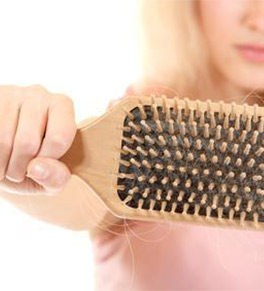
A very common concern for preoperative bariatric patients is regarding the potential for hair loss after weight loss surgery. It is not unusual to have some hair loss after weight loss surgery. Why might you experience this hair loss? Both major surgery and rapid weight loss can contribute to hair loss.
Our hair goes through a cycle that consists of hair growth, inactivity and loss. This process is usually in a state of balance so we do not notice minimal hair loss, but after some type of stress inducing factor including weight loss surgery an imbalance to this cycle may occur. This disruption to the cycle may cause more noticeable hair loss. When our bodies are stressed, our bodily stores of essential nutrients will go where they are needed and may leave some impact to your hair.
There are both nutritional and non nutritional factors that can play a major role in hair loss after weight loss surgery or any other bodily stress such as postoperatively after any other type of surgery, following a very high fever or infection, hormonal imbalances such as pregnancy, hormonal therapies, rapid weight loss with or without surgery, iron, zinc or biotin deficiency, inadequate protein intake and some medications etc.
Hair loss can continue until the hair cycle becomes balanced again. Hair loss can be stressful as it involves our body image. It can take time and patience, but with sound nutritional intake, the hair will grow back usually within 6 months. The lack of proper nutrition can lead to further hair loss.
What nutrients play a role in hair growth? Remember, if you are not deficient in these nutrients, supplementation most likely will not result in change. To best protect yourself from nutritional deficiencies, speak with your registered dietitian for recommendations for a complete multivitamin and mineral supplement.
1. Protein-60-80 grams of protein per day are essential. Low protein intake is associated with hair loss. Our bodies will hold on to protein when we are not eating enough, therefore staying in the inactive hair stage longer than the hair growth phase. Protein is required for many vital functions. Protein aids in wound healing, boosts immunity, maintains muscle mass etc. Keratin is a protein that makes up hair. Proteins are made up of amino acids. When we eat protein, the protein is broken down during digestion to amino acids. These amino acids then form new proteins and can be used to be involved in tissue growth and repair. Deficiencies in protein can cause hair to become more elastic, decrease hair strength and even change the color.
2. Biotin- 300 mcg/ day. Bitoin is a B-complex vitamin and helps to convert carbohydrates to glucose, involved in protein and fat metabolism and helps hair, skin and nail growth. Biotin is a water soluble vitamin and can be found in supplement form and foods such as egg yolk, bananas, whole grains and soybeans.
3.Iron-18 mg/day after Gastric Sleeve (individual patients may require more) 30-65mg iron/day after Gastric Bypass depending on gender and presence of menses. Iron is necessary to form hemoglobin within red blood cells to carry oxygen from the lungs to the rest of the body. Needs for iron after Gastric Bypass are higher due to malabsorption. Dietary sources of iron are liver, meats, poultry, beans, nuts, many green leafy vegetables and whole grains or enriched cereals. Make sure your multivitamin contains adequate iron or purchase an additional iron supplement.
4.Zinc-15 mg/day. Zinc is an essential mineral that is found naturally in many foods such as: lean red meat, poultry, pork and beef liver, oysters, crab, nuts, beans, wheat germ and miso. Zinc can also be found in supplement form if your multivitamin does not contain enough. Zinc’s role is in the structure of cell membranes and production of many enzymes including those enzymes that are involved in the production of genetic material. Zinc is essential for wound healing, skin, immune function,taste and smell.
5. Fluids- 64oz fluid per day– stay hydrated!!!! Dehydration can cause hair loss.
6.Essential Fatty Acids- Both Omega-3 and Omega- 6 fatty acids are essential and need to be obtained from our diet from foods like fish, flaxseeds, walnuts, some leafy vegetables and fish oil supplementation. Patients that have the Gastric Bypass are more at risk for essential fatty acid deficiency due to malabsorption.
7.Copper– Copper is an essential trace mineral required in the formation of red blood cells and helps to carry and store iron. Copper is needed for the formation of collagen- connective tissue and also helps create melanin, a pigment that gives color to skin and hair. Copper can be found in foods such as beef or chicken liver, crab, nuts, oysters and beans.
Hair loss following weight loss surgery may last 6-12 months or more depending on the cause of the hair loss. Limit the amount of chemical processes you treat your hair to during this time including hair coloring, chemical straightening or perms can cause hair to weaken and lead to increased hair loss. Speak to your hairstylist for suggestions for a new style to get your through this period of hair loss. If you are still experiencing hair loss after this post-op period despite following nutritional guidelines you have been given by your bariatric surgeon and registered dietitian, make an appointment with your surgeon to discuss other possible treatment options such as minoxidil drug therapy.

